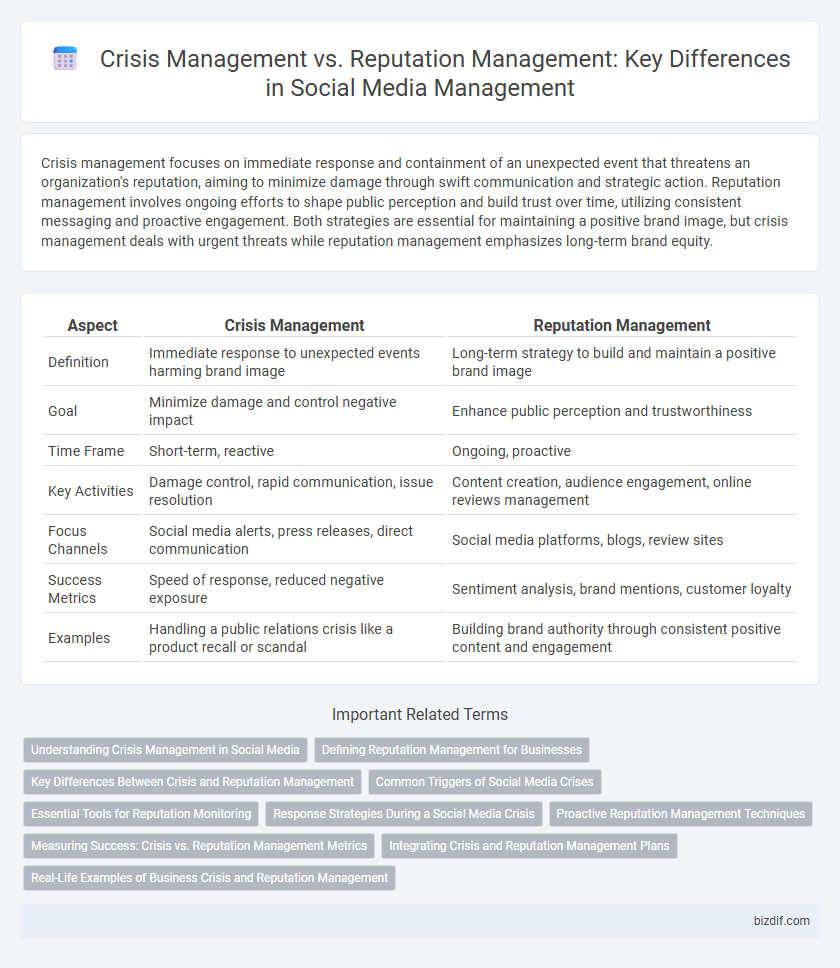Crisis management focuses on immediate response and containment of an unexpected event that threatens an organization's reputation, aiming to minimize damage through swift communication and strategic action. Reputation management involves ongoing efforts to shape public perception and build trust over time, utilizing consistent messaging and proactive engagement. Both strategies are essential for maintaining a positive brand image, but crisis management deals with urgent threats while reputation management emphasizes long-term brand equity.
Table of Comparison
| Aspect | Crisis Management | Reputation Management |
|---|---|---|
| Definition | Immediate response to unexpected events harming brand image | Long-term strategy to build and maintain a positive brand image |
| Goal | Minimize damage and control negative impact | Enhance public perception and trustworthiness |
| Time Frame | Short-term, reactive | Ongoing, proactive |
| Key Activities | Damage control, rapid communication, issue resolution | Content creation, audience engagement, online reviews management |
| Focus Channels | Social media alerts, press releases, direct communication | Social media platforms, blogs, review sites |
| Success Metrics | Speed of response, reduced negative exposure | Sentiment analysis, brand mentions, customer loyalty |
| Examples | Handling a public relations crisis like a product recall or scandal | Building brand authority through consistent positive content and engagement |
Understanding Crisis Management in Social Media
Crisis management in social media involves swiftly identifying and addressing negative events to minimize damage to a brand's image through real-time monitoring and strategic communication. It requires coordinated responses to mitigate misinformation, control the narrative, and maintain public trust during incidents such as product recalls, scandals, or viral complaints. Effective crisis management leverages sentiment analysis, timely engagement, and transparent updates to protect and restore a brand's online reputation.
Defining Reputation Management for Businesses
Reputation management for businesses involves monitoring, influencing, and maintaining a positive public perception across digital platforms and social media channels. It encompasses proactive strategies to enhance brand image, respond effectively to customer feedback, and mitigate negative content that could damage credibility. Consistent reputation management supports customer trust, strengthens brand loyalty, and drives long-term business success.
Key Differences Between Crisis and Reputation Management
Crisis management focuses on immediate response to unexpected negative events threatening a brand's stability, while reputation management involves ongoing strategies to build and maintain positive public perception. Crisis management typically requires rapid action and communication to mitigate damage, whereas reputation management emphasizes long-term brand image cultivation through consistent messaging and stakeholder engagement. Understanding these distinctions helps social media managers tailor their approach to either quickly contain a crisis or strategically enhance the brand's standing over time.
Common Triggers of Social Media Crises
Common triggers of social media crises include negative publicity, product failures, insensitive posts, and customer service mishaps. Rapid information spread on platforms like Twitter and Facebook can escalate these issues quickly, intensifying public backlash. Effective crisis management requires immediate response strategies, while reputation management focuses on long-term brand perception and trust rebuilding.
Essential Tools for Reputation Monitoring
Essential tools for reputation monitoring in social media management include sentiment analysis platforms, real-time social listening software, and automated alert systems that track brand mentions across multiple channels. These tools enable businesses to detect emerging crises early, assess public perception accurately, and respond proactively to maintain a positive brand image. Integrating AI-powered analytics enhances the ability to identify trends and potential threats, ensuring comprehensive oversight of online reputation.
Response Strategies During a Social Media Crisis
Effective response strategies during a social media crisis involve timely, transparent communication to address the issue directly and mitigate negative impact. Crisis management prioritizes immediate damage control through real-time monitoring and rapid responses, while reputation management focuses on long-term trust-building by consistently reinforcing brand values and positive narratives. Combining swift crisis intervention with ongoing reputation efforts ensures a comprehensive approach to maintaining brand integrity in the digital landscape.
Proactive Reputation Management Techniques
Proactive reputation management techniques in social media focus on continuous monitoring of brand mentions, timely engagement with audiences, and the creation of positive content to build trust before crises arise. Leveraging sentiment analysis and automated alerts enables early detection of potential issues, allowing brands to address concerns privately and prevent escalation. Consistent transparency and authentic communication reinforce brand integrity and minimize the impact of negative events on long-term reputation.
Measuring Success: Crisis vs. Reputation Management Metrics
Measuring success in crisis management relies on metrics such as response time, sentiment shift, and resolution rate to assess how effectively a company mitigates negative impacts during a social media crisis. Reputation management metrics focus on long-term indicators like brand sentiment trends, share of voice, and customer engagement rates to evaluate sustained brand perception and loyalty. Combining real-time analytics with periodic sentiment analysis provides a comprehensive view of both immediate crisis outcomes and ongoing reputation health on social platforms.
Integrating Crisis and Reputation Management Plans
Integrating crisis management and reputation management plans ensures a unified approach that minimizes brand damage during emergencies while sustaining long-term public trust. Centralizing communication protocols and monitoring social sentiment allows rapid response to crises and proactive reputation enhancement through consistent messaging. This synergy enhances resilience, enabling brands to recover swiftly and maintain credibility in an increasingly digital and connected social media landscape.
Real-Life Examples of Business Crisis and Reputation Management
Companies like Johnson & Johnson exemplify effective crisis management by swiftly addressing the 1982 Tylenol poisoning incident, recalling products, and rebuilding trust through transparent communication. In contrast, Starbucks faced reputation management challenges following the 2018 Philadelphia arrest incident, responding with company-wide racial bias training to restore public confidence. These cases highlight the importance of prompt crisis response paired with long-term reputation strategies to mitigate damage and regain consumer trust.
Crisis management vs Reputation management Infographic

 bizdif.com
bizdif.com